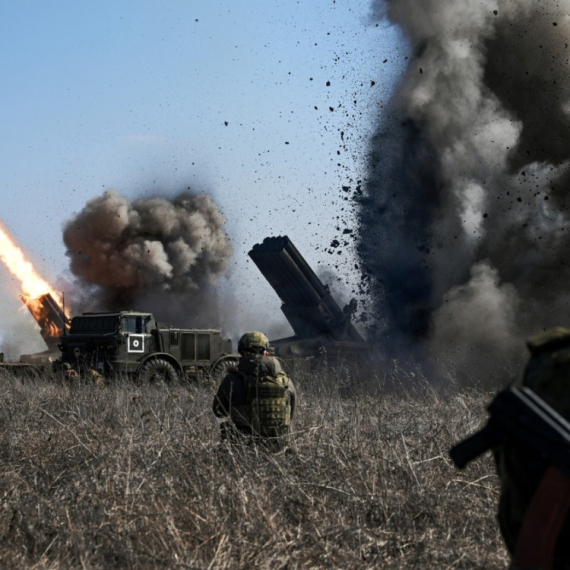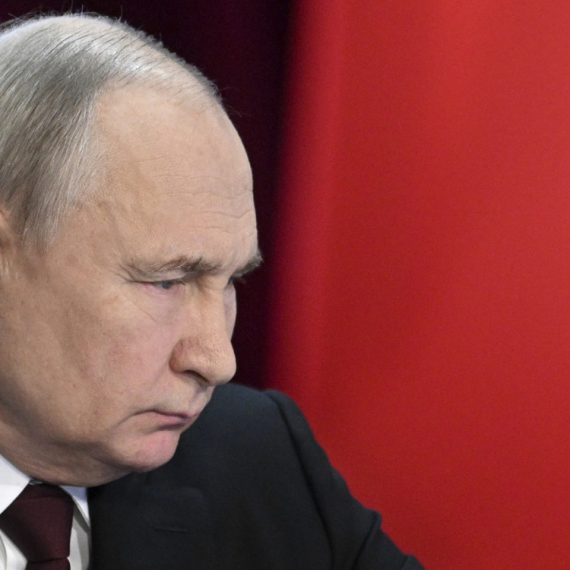U.S. "shelves Europe missile plan"
The U.S. is to abandon its controversial plan to build a missile defense system in Poland and the Czech Republic, the Czech prime minister has announced.
Thursday, 17.09.2009.
10:49

The U.S. is to abandon its controversial plan to build a missile defense system in Poland and the Czech Republic, the Czech prime minister has announced. Reports from the U.S. said it would be dropped as Iran's long-range missile plans had advanced less than predicted. U.S. "shelves Europe missile plan" The U.S. decision marks a major foreign policy shift which could impact on its dealings with Europe, Russia and Iran. The Pentagon has now confirmed there will be a major change, with more details expected later on Thursday. Russia, which saw the missile plan as a threat, welcomed the move. The U.S. signed a deal in August 2008 with Poland to site 10 interceptors at a base near the Baltic Sea, and with the Czech Republic to build a radar station on its territory. President Obama earlier this year ordered a review of the defense system, which was strongly backed by his predecessor George W Bush. European protection On Thursday, Czech Prime Minister Jan Fischer said Obama had notified him of the change of plan. He told the BBC that Obama phoned him late last night to inform him that he had "reconsidered" the missile plan. The missile shield was expected to be fully operational by 2012. Washington said the European sites were needed to protect European allies and U.S. forces in Europe from Iran or another country. However, the Wall Street Journal reported: "The U.S. will base its decision on a determination that Iran's long-range missile program has not progressed as rapidly as previously estimated, reducing the threat to the continental U.S. and major European capitals, according to current and former U.S. officials." The newspaper, quoting unnamed sources, said the White House would order "a shift towards the development of regional missile defenses for the Continent" to combat the threat from Iran's short- and medium-range missiles. Fischer said a U.S. delegation would make an announcement later on Thursday. U.S. Defense Secretary Robert Gates was also due to give a press conference. Short-range threat The newspaper, quoting unnamed sources, said the White House would order "a shift towards the development of regional missile defences for the Continent" to combat the threat from Iran's short- and medium-range missiles. An announcement is expected later by U.S. Defense Secretary Robert Gates and military staff at a news conference , the Associated Press reported. Iran says its missile development programme is solely for scientific, surveillance or defensive purposes, but there are concerns in the West and among Iran's neighbours that the rockets could be used to carry nuclear weapons. As part of long-running efforts to tackle the issue, Iran will hold talks on its nuclear programme on 1 October with the UK, China, France, Russia and the U.S. - the five permanent UN Security Council members - and Germany. Iran says its missile development program is solely for scientific, surveillance or defensive purposes, but there are concerns in the West and among Iran's neighbors that the rockets could be used to carry nuclear weapons. As part of long-running efforts to tackle the issue, Iran will hold talks on its nuclear programme on October 1 with the UK, China, France, Russia and the U.S. - the five permanent UN Security Council members - and Germany. "Rogue" states The Wall Street Journal said the Obama administration "was expected to leave open the option of restarting the Polish and Czech system if Iran makes advances in its long-range missiles in the future." Russia saw the U.S. missile plan as a direct threat to itself, despite U.S. assurances that it was aimed at "rogue" states, such as Iran. A Russian foreign minister spokesman was quoted by Interfax news agency as saying Russia was awaiting confirmation of the reports. "In principle, such a development of the situation would correspond to the interests of the development of our bilateral relations with the USA," the spokesman said. In November, Russia moved its own ballistic missiles to Kaliningrad, between Nato member states Lithuania and Poland to "neutralise - if necessary - the [U.S.] anti-missile system", President Dmitry Medvedev said at the time. Medvedev also said Russia would jam the U.S. anti-missile system electronically.
U.S. "shelves Europe missile plan"
The U.S. decision marks a major foreign policy shift which could impact on its dealings with Europe, Russia and Iran.The Pentagon has now confirmed there will be a major change, with more details expected later on Thursday.
Russia, which saw the missile plan as a threat, welcomed the move.
The U.S. signed a deal in August 2008 with Poland to site 10 interceptors at a base near the Baltic Sea, and with the Czech Republic to build a radar station on its territory.
President Obama earlier this year ordered a review of the defense system, which was strongly backed by his predecessor George W Bush.
European protection
On Thursday, Czech Prime Minister Jan Fischer said Obama had notified him of the change of plan.He told the BBC that Obama phoned him late last night to inform him that he had "reconsidered" the missile plan.
The missile shield was expected to be fully operational by 2012.
Washington said the European sites were needed to protect European allies and U.S. forces in Europe from Iran or another country.
However, the Wall Street Journal reported: "The U.S. will base its decision on a determination that Iran's long-range missile program has not progressed as rapidly as previously estimated, reducing the threat to the continental U.S. and major European capitals, according to current and former U.S. officials."
The newspaper, quoting unnamed sources, said the White House would order "a shift towards the development of regional missile defenses for the Continent" to combat the threat from Iran's short- and medium-range missiles.
Fischer said a U.S. delegation would make an announcement later on Thursday. U.S. Defense Secretary Robert Gates was also due to give a press conference.
Short-range threat
The newspaper, quoting unnamed sources, said the White House would order "a shift towards the development of regional missile defences for the Continent" to combat the threat from Iran's short- and medium-range missiles.An announcement is expected later by U.S. Defense Secretary Robert Gates and military staff at a news conference , the Associated Press reported.
Iran says its missile development programme is solely for scientific, surveillance or defensive purposes, but there are concerns in the West and among Iran's neighbours that the rockets could be used to carry nuclear weapons.
As part of long-running efforts to tackle the issue, Iran will hold talks on its nuclear programme on 1 October with the UK, China, France, Russia and the U.S. - the five permanent UN Security Council members - and Germany.
Iran says its missile development program is solely for scientific, surveillance or defensive purposes, but there are concerns in the West and among Iran's neighbors that the rockets could be used to carry nuclear weapons.
As part of long-running efforts to tackle the issue, Iran will hold talks on its nuclear programme on October 1 with the UK, China, France, Russia and the U.S. - the five permanent UN Security Council members - and Germany.
"Rogue" states
The Wall Street Journal said the Obama administration "was expected to leave open the option of restarting the Polish and Czech system if Iran makes advances in its long-range missiles in the future."Russia saw the U.S. missile plan as a direct threat to itself, despite U.S. assurances that it was aimed at "rogue" states, such as Iran.
A Russian foreign minister spokesman was quoted by Interfax news agency as saying Russia was awaiting confirmation of the reports.
"In principle, such a development of the situation would correspond to the interests of the development of our bilateral relations with the USA," the spokesman said.
In November, Russia moved its own ballistic missiles to Kaliningrad, between Nato member states Lithuania and Poland to "neutralise - if necessary - the [U.S.] anti-missile system", President Dmitry Medvedev said at the time.
Medvedev also said Russia would jam the U.S. anti-missile system electronically.

























































Komentari 25
Pogledaj komentare